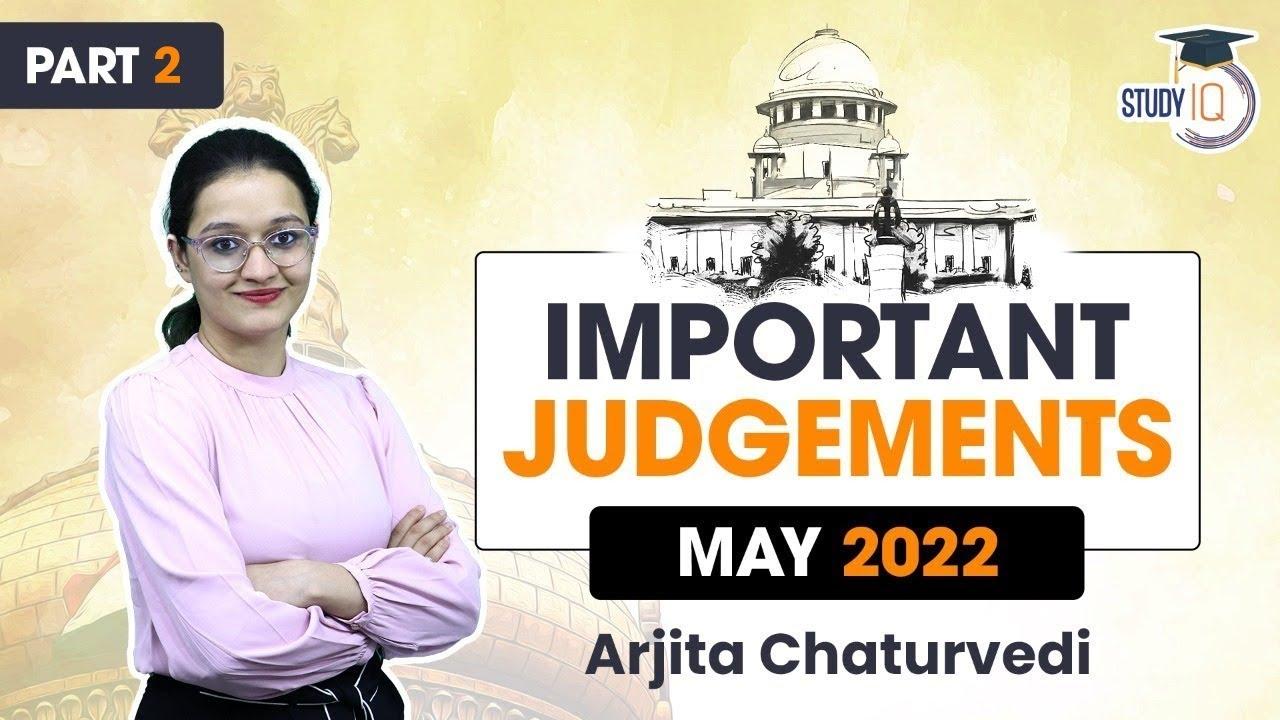Table of Contents
Budhadev Karmaskar v. State of West Bengal And Ors.
Bench of Justices L. Nageswara Rao, B.R. Gavai and A.S. Bopanna
- The court had ordered setting up of a panel headed by senior advocate Pradip Ghosh as chairman to suggest measures to prevent trafficking, rehabilitate sex workers who wish to leave it, and also to make conditions conducive for sex workers who wish to continue working to do that with dignity.
- Subsequently, in 2016, when the matter was listed, the Union Government had informed the Court that the recommendations made by the Panel were under consideration and a draft legislation was published incorporating the same.
- Article 142 provides discretionary power to the Supreme Court as it states that the Supreme Court in the exercise of its jurisdiction may pass such decree or make such order as is necessary for doing complete justice in any cause or matter pending before it.
- The Bench reiterated that the right to life extends include the right to live with human dignity and the bare necessities of life like adequate nutrition, clothing and shelter. Acknowledging the right to life with dignity, undoubtedly, extends to sex workers and their children, the Bench directed State Government to act in strict compliance of some of the recommendations made by the Panel, which were also accepted by the Union Government.
- Any sex worker who is a victim of sexual assault should be provided with all facilities available to a survivor of sexual assault, including immediate medical assistance, in accordance with Section 357C of the Code of Criminal Procedure, 1973.
- The State Governments may be directed to do a survey of all Protective Homes so that cases of adult women, who are detained against their will can be reviewed and processed for release in a time-bound manner.
- Police should treat all sex workers with dignity and should not abuse them, both verbally and physically, subject them to violence or coerce them into any sexual activity.
- The Press Council of India should be urged to issue appropriate guidelines for the media to take utmost care not to reveal the identities of sex workers, during arrest, raid and rescue operations, whether as victims or accused and not to publish or telecast any photos that would result in disclosure of such identities
T.N. Godavarman Thirumulpad vs Union Of India
Bench of Justices L Nageswara Rao, B R Gavai and Aniruddha Bose
- The Supreme Court revoked the approval granted by the Standing Committee of National Board for Wildlife (NBWL) for doubling of existing railway line from Castlerock (Karnataka) to Kulem (Goa).
- In Vellore Citizens’ Welfare Forum v. Union of India , this Court held that the ‘Precautionary Principle’ is an essential feature of the principle of ‘Sustainable Development …The principle of precaution involves the anticipation of environmental harm and taking measures to avoid it or to choose the least environmentally harmful activity.
- This Court held that in case of a doubt, protection of environment would have precedence over the economic interest.
Ms P vs State of Madhya Pradesh
Bench of Chief Justice of India NV Ramana, Justice Krishna Murari and Justice Hima Kohli
- In a case where posters saying “Bhaiya is back” was put up to celebrate the release of a rape-accused on bail, the Supreme Court set aside the bail, observing that “brazen conduct of the accused has evoked a bona fide fear in complainant’s mind that she would not get a free and fair trial if he remains enlarged on bail and that there is a likelihood of his influencing the material witnesses”.
- Circumstances where bail granted to the accused under Section 439 (1) of the Cr.P.C. can be cancelled are enumerated below: –
- a) If he misuses his liberty by indulging in similar/other criminal activity;
- b) If he interferes with the course of investigation;
- c) If he attempts to tamper with the evidence;
- d) If he attempts to influence/threaten the witnesses;
- e) If he evades or attempts to evade court proceedings;
- f) If he indulges in activities which would hamper smooth investigation;
- g) If he is likely to flee from the country;
K Dhandapani vs State
Bench of Justices L Nageswara Rao and B R Gavai
- The Supreme Court set aside the conviction of a man accused in a POCSO case after noticing that he had married the prosecutrix and had two children.
- The accused, who is the maternal uncle of the prosecutrix, was convicted under Sections 5(j)(ii)read with Section 6, 5(I) read with Section 6 and 5(n) read with Section 6 of Protection of Child from Sexual Offences (POCSO) Act, 2012. He was sentenced to undergo rigorous imprisonment for a period of 10 years. The Madras High Court upheld the conviction and sentence.
Gurukanwarpal Kirpal Singh vs Surya Prakasam
Bench of Justices Indira Banerjee and CT Ravikumar
- The Supreme Court observed that the offence of criminal breach of trust under Section 405 will not be attracted if there was no entrustment of the property with the accused.
Download| Free PDF























 WhatsApp
WhatsApp